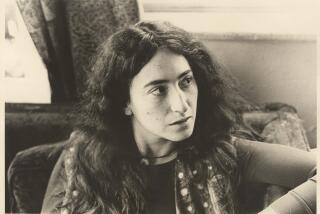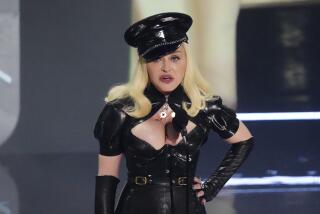Rosa Luxemburg: A LIFE by Elzbieta Ettinger (Beacon: $24.95; 278 pp., illustrated) : Red Jenny: A LIFE WITH KARL MARX by H. F. Peters (St. Martin’s: $14.95; 182 pp., illustrated)
- Share via
The reader could not be presented with two more different women or two more different approaches to them. Rosa Luxemburg ranks with Lenin and Trotsky as a Marxist thinker and organizer, while Jenny Marx (nee Von Westphalen) was the supportive, loving helpmeet of Marxism’s founder. Elzbieta Ettinger plumbs Rosa’s emotional life, while H. F. Peters simply relates Jenny’s life.
Ettinger, a professor of rhetoric at MIT, who has edited a collection of Luxemburg’s letters to Leo Jogiches, her first lover and political companion, writes in this preface: “Besides the renowned revolutionary . . . there is another Rosa Luxemburg, a largely unknown person thrice stigmatized: as a woman, as a Jew, and as a cripple. . . . Once we come to know her dreams and her struggles, she becomes our contemporary: a woman who firmly believed that personal happiness can be achieved without sacrificing public life and whose fight for both a personal and a public life was hard, stubborn, and not always rewarding.”
Ettinger’s psychological explanations for her subject’s motivations are not satisfying; she fails to link convincingly Luxemburg’s personal history to her politics, and she provides no critical perspective on what, after all, is the main reason for reading a life of Rosa Luxemburg, her theoretical and political activities.
Ettinger has no evidence relating to Luxemburg’s feelings about the conditions of her youth, but tries to compensate with a historical picture of Luxemburg’s youthful surroundings and speculations about the emotional effects of that milieu. This weld does not work; the early chapters are disjointed and unconvincing. As the story proceeds, and more casual factors are needed to “explain” the adult Luxemburg’s political and personal behavior, Ettinger resorts to dubious speculations. In at least a dozen places, we find comments such as: “No doubt she wanted badly to attend school”; “It is not difficult to imagine what was going on in Rosa’s mind”; “(Jogiches) may have found in her limp yet another humiliation”; “One may surmise what went through Costia Zetkin’s mind upon reading these words.”
At book’s end, one is left with the impression that Rosa Luxemburg’s life was a massive Freudian reversal syndrome. At age 10, Rosa was admitted to a gymnasium under a racial quota system. Ettinger writes: “A sensitive child, she felt degraded. It was at this point that she started her protracted fight to remove the stigma, and the choices she made in later life, personal and public, were a direct or indirect reaction to the child’s humiliation.” When her affair with the much younger Zetkin ended, Ettinger writes about the 42-year-old Luxemburg: “Lonely and sick at heart, she increasingly sought in humanity the wholeness and security that her parental home and her lovers had failed to give her.”
Peters, who has written biographies on Rilke, Nietzsche, and Lou Andreas-Salome, takes a different approach to his subject. He is content to record the facts about Jenny’s life with her husband and her children, “as she herself gave them.” Although he does mention several useful pieces of emotional evidence that might alter Jenny’s version, he does not fully examine their significance. A much fuller use of this evidence, and hence a fuller picture of Jenny, is to be found in the early chapters of Yvonne Kapp’s biography of the Marx’s youngest daughter, “Eleanor Marx.”
Kapp understands better than Peters that the circumstances surrounding Jenny Marx’s married life did not simply make her unhappy or depressed, but probably drove her over the edge of an emotional abyss. Her husband was exiled several times, she lost three children, he carried on an affair with the family’s maid and probably fathered a child with her, and the family was dreadfully poor. Marx wrote Engels in 1868: “My wife has been in a hysterical state for years--understandable from the circumstances but for that reason not more pleasant--and is torturing the children to death with her lamentations, crankiness, and ill humor.” Several years later, Marx wrote his future son-in-law, Paul Lafargue: “You know that I have sacrificed my entire fortune to the revolutionary struggle. I do not regret it. On the contrary, I would do the same, if I had to start my career over again. But I would not marry. As far as it lies in my power I intend to save my daughter from the reefs on which her mother’s life has been wrecked.”
Ironically, because Peters is not judgmental and is satisfied with tracing the patterns of the couple’s life together, this biography brings Karl Marx into better focus than it does Jenny. He becomes less the center of revolutionary upheaval in Europe, and more an inhabitant of “Grub Street,” a writer struggling to make a living for his family and a reputation for himself and failing at both.
More to Read
Sign up for our Book Club newsletter
Get the latest news, events and more from the Los Angeles Times Book Club, and help us get L.A. reading and talking.
You may occasionally receive promotional content from the Los Angeles Times.










